1987 World Cup Recap - Revisiting unforgettable moments
The 1987 World Cup was the first edition of the World Cup to be held outside of England.
8 Min Read
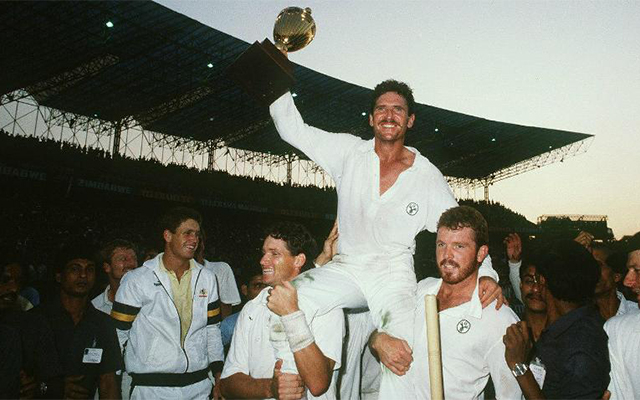

After beating the mighty West Indies in the final of the 1983 World Cup, India had announced itself as a force to be reckoned with in the cricketing world. The win revolutionised the sport forever in the nation with the excitement and the fervour unmatched by the fans of any other country. Hence, to cater to the millions of cricket fanatics residing in the subcontinent, the 1987 Cricket World Cup was jointly hosted by India and Pakistan.
However, the transition wasn’t smooth as the journey to bring the World Cup to India was filled with several hurdles. Notably, N.K.P Salve who was the then president of the BCCI (Board of Control for Cricket in India) was given just two passes by TCCB (The Test and County Cricket Board), which looked after English cricket back then, to watch the final of 1983 World Cup at Lord’s. Hence, he could not arrange passes for the large number of people who had flown from India to watch the epic final.
Salve felt insulted by the denial by TCCB to provide more passes and had a meeting with the then PCB (Pakistan Cricket Board) president Air Marshall Nur Khan the day after the final. The duo planned to take the World Cup away from the colonial masters. To garner support from the other participating nations, India and Pakistan jointly bid to provide a sum of 40,000 pounds to each participating nation for the tournament as opposed to 20,000 pounds being provided by the TCCB.
As a result, with the support of the other participating teams, the World Cup was finally brought to India and Pakistan. The Indian government contacted industrialist Dhirubhai Ambani to sponsor the event and hence the 1987 World Cup was officially called ‘The Reliance Cup’ after his company's name.
Also Check: ODI Cricket World Cup Winners List from 1975 to 2023
Participating teams and format
The tournament was contested among the eight participating nations which were the seven countries holding Test status at that time namely Australia, England, India, New Zealand, Pakistan, Sri Lanka and West Indies. Apart from them, Zimbabwe also managed to qualify for the event for the second consecutive time by winning the 1986 ICC Trophy.
The teams were divided into two groups of four each where they faced each other twice in the group stages. The top two teams from each group qualified for the semi-finals with the winners of both matches locking horns in the summit clash. One major change that the 1987 World Cup brought was the reduction in number of overs from 60 to 50 overs per side. To appeal to the mass audience in the cricket-crazy nation, Doordarshan was awarded the rights to telecast matches live in India ahead of many private companies.
India lose their opening fixture by one run
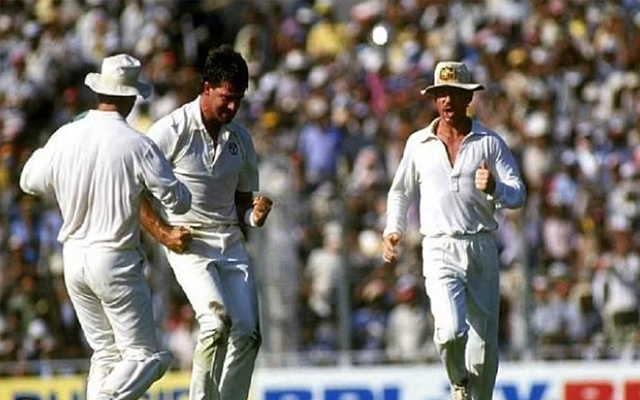
The tournament finally got underway with co-hosts Pakistan taking on Sri Lanka and winning the fixture by 16 runs. However, the crowd was in for a treat during the third game between India and Australia in Chennai. Notably, the two teams were a part of the historic tied Test at the same venue the previous year and were expected to pull off another thrilling encounter for the fans.
The game lived up to its reputation as India were handed a one-run loss after failing to chase the target of 270. What makes the game even more interesting is the fact that during the first innings, Dean Jones was dropped by Ravi Shastri at long off and the ball fell outside of the boundary.
The Indians claimed that the ball had bounced before crossing the fence and hence the umpire signalled a four. However, the Australians were unhappy with the decision and during the lunch break their manager walked into the Indian dressing room expressing his disappointment on it.
As a result, Indian captain Kapil Dev agreed to their request as a sporting gesture and Australia’s score was revised from 268 to 270. The decision turned out to be a game-changer for the Aussies as they went on to win by just one run.
England knockout West Indies before semi-finals for first time
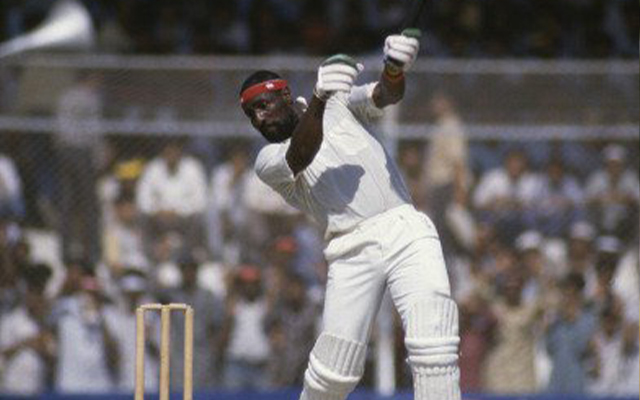
The two-time champions locked horns with England in a must-win encounter in Jaipur during Match 18 of the tournament. West Indies skipper Viv Richards won the toss and elected to field first. England posted a good score of 269/5 riding on Graham Gooch’s sensational 92 (137). In reply, the Windies were bundled out for 235 and lost the game by 34 runs. The loss led to the end of the West Indies' dominant run in the World Cup as they were knocked out before the semi-finals for the first time.
Chetan Sharma scalps first hat-trick in World Cup history
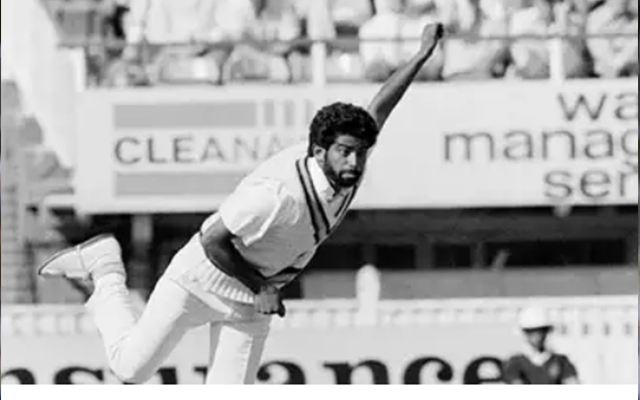
Record books were shattered in India’s last league fixture vs New Zealand in Nagpur as Chetan Sharma etched his name in history by becoming the first bowler to pick up a hat-trick in the tournament. Sharma dismantled the stumps of Ken Rutherford, Ian Smith and Ewen Chatfield on the last three balls of the 42nd over to claim the first hat-trick by an Indian and the first in World Cup history as well.
Sunil Gavaskar scores his first ODI hundred off 88 balls
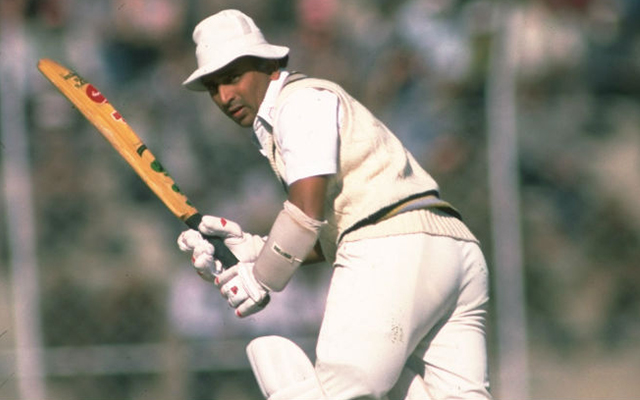
Courtesy of Sharma’s spell of 3/51 in ten overs, New Zealand suffered a dramatic collapse and could only reach 221/9 in their allotted 50 overs. In reply, India had to chase down the target in 42.2 overs to top the group and avoid a semi-final clash with Pakistan in Lahore.
Opener Sunil Gavaskar was up to the task and played a sensational innings of 103* (88) to aid India’s cause helping them chase down the target in just 32.1 overs. Notably, it was the first and only century of Gavaskar’s ODI career.
Australia and England spoil hopes of India vs Pakistan final
Having finished second in the group, Australia took on Pakistan in the first semi-final in Karachi. Opting to bat first in a packed stadium, Australia posted 267/8 riding on David Boon’s knock of 65 (91). In reply, Pakistan were on course in the chase but lost their way after captain Imran Khan (58 off 84) got out leaving his side on 150/4. As a result, Australia won the match by 18 runs with Craig McDermott being awarded Player of the Match for his spell of 5/44.
Graham Gooch's sweep theory to counter Indian spin attack
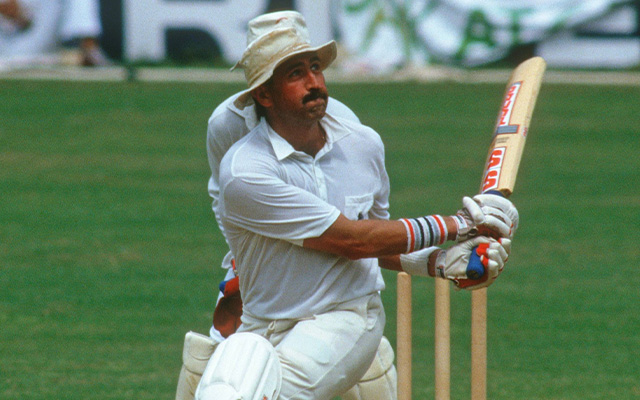
In the second semi-final, India locked horns with England in Bombay. Ahead of the game, England were well aware of the threat Indian left-arm spinners Ravi Shastri and Maninder Singh would pose. Hence, captain Mike Gatting and opener Graham Gooch decided to go after them with their ‘sweep theory’.
To prepare for the game, Gooch batted against left-arm spinners for two days and kept on sweeping them in the nets. The ploy worked wonders for them as Gooch (115 off 136) and Gatting (56 off 62) helped their side post 254/6 in the first innings. In reply, India were bundled out for 219 and were knocked out of the tournament. As a result, fans' hopes of seeing an India vs Pakistan final were crushed by Australia and England.
In the big final, both Australia and England locked horns at the iconic Eden Gardens stadium in Kolkata. Having failed to win the trophy in the final once before, both teams were eager to be crowned the World Champions. Australian skipper Allan Border won the toss and elected to bat first as David Boon (75 off 125) once again guided his team to a good total of 253/5.
Also Check: ODI Cricket World Cup All-Time Records
Mike Gatting's reverse sweep triggers England's collapse in the final
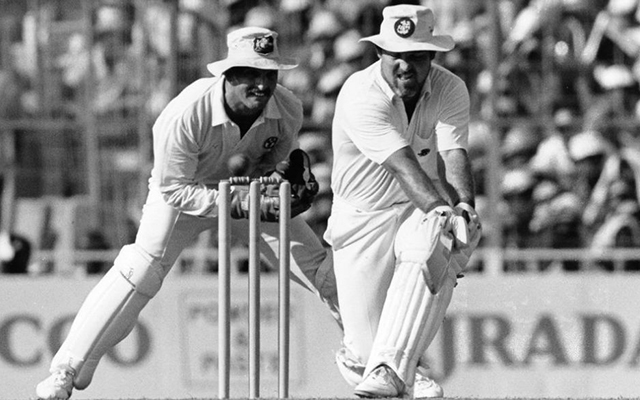
In reply, England were going strong at 135/2 with captain Mike Gatting (41 off 44) and Bill Athey at the crease. Seeing his bowlers being smashed all around the park, Border decided to bring himself into the attack. The move worked wonders as the England captain decided to reverse sweep Border but ended up top-edging the ball which hit his shoulder and carried to the wicketkeeper Greg Dyer.
Following Gatting’s wicket, other batters failed to keep their side in the chase and England eventually lost the final by seven runs. As a result, Allan Border’s men clinched Australia’s first-ever World Cup and laid the foundation for their domination in World Cricket in the years to come.
Graham Gooch and Craig McDermott top the batting and bowling charts
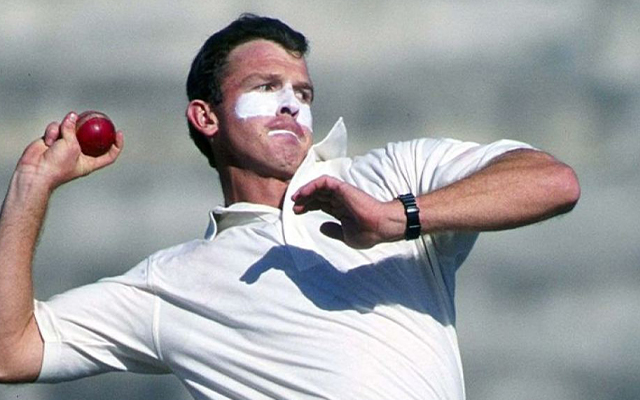
England’s Graham Gooch topped the runs chart having scored 471 runs in eight innings at an average of 58.87 with one hundred and three fifties to his name. On the other hand, Australia’s Craig McDermott took the honours in the wicket-takers list having picked 18 wickets from eight innings at an average of 18.94 and an economy of 4.67 with one four-fer and one five-fer to his name.
The 1987 World Cup was the beginning of the shifting of power in world cricket from England and Australia to the subcontinent. The cricket-crazy crowd driven by sheer passion to support their respective teams turned up in huge numbers to watch every game making the tournament successful. The 1987 World Cup was also the last edition of the tournament played in white clothes as colourful jerseys and day-night matches were waiting for teams in 1992.
Download Our App